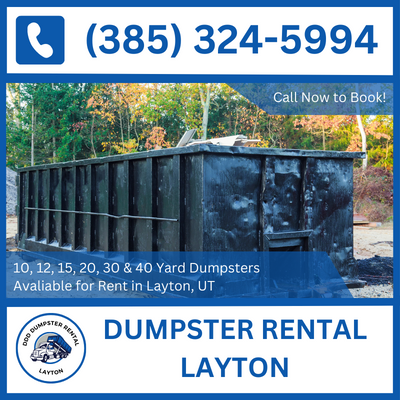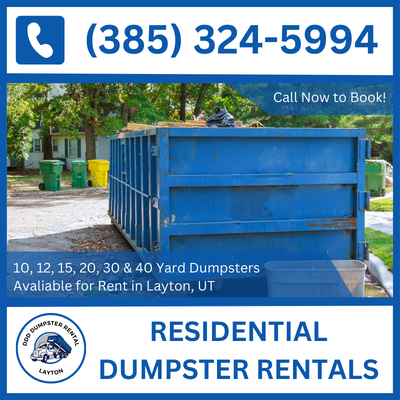The Complete Guide to Dumpster Rental Dos and Don'ts
Renting a dumpster for a major cleanout or renovation project provides a convenient, cost-effective way to remove large quantities of waste. However, navigating dumpster rental policies on what you can and can't throw away can be tricky. Understanding these regulations is key to avoiding violations resulting in fees or penalties.
This comprehensive guide to dumpster rental dos and don'ts will cover:
- Benefits of renting a dumpster
- Applicable rules and regulations
- Commonly permitted disposal items
- Preparing items properly for dumpster disposal
- Top frequently asked questions
- Alternatives to dumpster rental
We will outline specific guidelines on hazardous materials to avoid, like:
- Batteries
- Chemicals
- Oils and automotive fluids
As well as prohibited items like:
|
Prohibited Items |
|
Appliances with refrigerants |
|
Tires and car batteries |
|
Fuel, oil, and propane tanks |
Having a clear understanding of dumpster rental best practices for your area is crucial to ensure you rent the right container size, avoid extra fees, and dispose of renovation or cleanout debris responsibly.
Let's get started on navigating dumpster rental policies so your next dumpster rental goes smoothly!
Benefits of Renting a Dumpster
Renting a dumpster for your spring cleaning or DIY remodel brings some major perks compared to traditional trash removal. For starters, you can toss practically anything into one of those big metal boxes - within reason, of course! We'll get to the details later.
Some key benefits include:
- Cost - Way cheaper than making multiple trips to the landfill
- Convenience - No need to beg friends with trucks or cram stinky things in your backseat
- Quickly clear out piles of junk and debris
- Did we mention no hauling heavy crap down three flights of stairs? 💪
- Avoid those weekend projects turning into month-long sagas
With the right prep and expectations on what can and can't go in, dumpster rental makes renovations, repairs, cleaning, and even moving less stressful. We've got the inside scoop to set you up for dumpster rental success!
Rules and Regulations
Before we get to the fun stuff you can toss in a dumpster, we need to cover the not-so-fun rules and regulations. We know, we know - rules are boring. But breaking dumpster rental guidelines can lead to extra fees or even fines so it's important to brush up.
Dumpster regulations vary by location, so specific restrictions depend on where you live. That said, some common themes apply across most states and cities.
Weight Limits
First up is weight - dumpster companies specify load limits for each container size. Exceed that weight and you'll pay extra fees. So no cramming a ton of super heavy debris like:
- Concrete blocks ️
- Dirt
- Asphalt shingles
Pro tip: Ask your rental company for exact weight allowances before your dumpster arrives.
Prohibited Items
Now for the no-no items you absolutely should not toss in:
Hazardous Waste
- Batteries
- Oils, gas & chemicals ⛽
- Paints & thinners
No exceptions here unless you enjoy environmental fines.
Appliances
- Fridges or AC units still containing any coolant chemicals are banned
- Safely remove refrigerants first before disposal
Tires & Car Parts
Sorry, you can't dump tires or old lead-acid car batteries either. Check locally for recycling programs.
Fuel Tanks
- No go on gas cylinders, propane tanks and similar containers that once stored flammable materials
Sketchy right? But rules exist for good reason - mismanaged disposal of hazardous stuff can pollute groundwater, leak chemicals into soil, or start electrical fires in landfills.
Penalties
Understandably, violations can trigger fines starting around $150 depending on your area. Some facilities even inspect dumpsters and charge per violation item. We're talking tires, batteries, appliances with refrigerants - you name it.
Our advice? Thoroughly check regulations in your city and clarify any gray areas with your rental provider upfront before loading!
Commonly Permitted Materials
Now for the good stuff! Unless stated otherwise by local regulations, you typically get the green light to toss these common items into your rental dumpster:
Construction & Demolition Debris
Knocking down walls for that open concept? Have at it! Most demolition debris is fair game:
- Drywall
- Wood scraps
- Tiles
- Countertops
- Sinks
- Bathtubs
- Piping
- Plaster
- Flooring
Just be cognizant of weight limits based on dumpster size.
Furniture & Household Junk
Kondo-ing your home? Pitch all that broken down or outdated furniture without guilt:
- Tables
- Chairs
- Shelves
- Sofas
- Mattresses
Along with smaller junk:
- Toys
- Clothes
- Tools
- Knick knacks
- Cardboard boxes
Note: Some cities require mattresses and cloth items be wrapped before dumping to avoid ripping.
Yard Waste
Landscaping or removing trees, bushes, plants? You can ditch all organic yard materials too like:
- Shrubs
- Tree branches
- Leaves
- Grass clippings
- Weeds
Unless indicated, most vegetation is A-OK.
Electronics
Out with the old laptops, TVs, printers! Consumer electronics without batteries can go into many standard dumpsters.
But unusually large items may exceed size and weight limits. When in doubt, ask!
Empty Aerosol Cans
A common misconception - empty spray paint, hairspray or other aerosols won't explode, so feel free to toss 'em!
Some key takeaways:
- Remove batteries from electronics
- Verify refrigerant is removed from AC units
- Ensure cans are fully empty before disposal
That covers the most common dumpster items! But additional regulations may apply for certain products, so when unsure, check with rental companies beforehand.
Preparing Items for Dumpster Disposal
Got an old dining set to ditch or overgrown shrubs to remove? Awesome! Now let’s talk logistics to maximize space and abide by those pesky dumpster rules.
Break It Down
Before tossing large stuff, disassemble items to save precious dumpster real estate.
- Take apart old Ikea furniture
- Remove doors from cabinets
- Break down lumber or wood packing crates
Use tools like hammers and crowbars to separate joined sections so debris takes up less cubic yards inside your rental.
Drain Fluids
Eliminate liquids from appliances and gas from containers to prevent spills or contamination:
- Tip remaining oils or fuels from lawn mower tanks into sealable containers for proper disposal
- Disconnect hoses to fully drain wet/dry vacs
- Remove last droplets of cleaning solutions from bottles
Contain Hazards
Properly contain anything toxic before disposal:
- Seal old paint cans to avoid leaks
- Place leaky car battery in a no-spill bucket
- Bag torn fertilizer bags releasing powders
And never mix random chemicals! Reaction risk.
Smart prep = maximum dumpster capacity and compliance. Let ‘er rip! Just...responsibly.
Top Dumpster Rental FAQs
We get A LOT of questions on which dumpster rental rules apply for specific situations. Let's tackle some top FAQs together:
What are standard dumpster sizes and weight limits?
Dumpsters range from 10-40+ cubic yards. Popular sizes:
- 10 yard - 1-2 bedrooms
- 20 yard - Large house projects
- 30 yard - Major renovations
Weight limits vary based on location and dumpster dimensions, but roughly:
- 10 yard holds 1-2 tons
- 30 yard supports 4 tons
Exceeding these limits risks extra fees.
How do I determine ideal dumpster size?
Consider yardage needed to contain all waste:
- What types of items will you dispose of?
- Are materials dense and heavy like concrete? That requires more capacity per cubic yard
- How many rooms or floors are involved?
More space ≠ more value if it goes mostly unused. Aim to max out yardage without overpaying!
What do I do if prohibited items end up in my dumpster?
First, take a deeeeep breath. Then promptly remove any batteries, chemicals, or other verboten materials.
Carefully seal leaking car batteries in leak-proof buckets for drop off at hazardous waste management centers.
Note: You may incur additional costs down the line if prohibited stuff shuttles off to landfills before you catch it. So stay vigilant!
Can I throw any kind of batteries in dumpsters?
A big N-O for hazardous vehicles and large batteries containing heavy metals and corrosive materials.
But, you can likely ditch regular AA or AAA single-use alkaline batteries under municipal trash rules. They break down over time without leaking chemicals. Just avoid loosely tossing in case of damage.
When uncertain, check locally or call sanitation departments.
What if my dumpster overflows before completion?
No worries! If you underestimated waste amounts, promptly call the provider to schedule an affordable same-site switcheroo to a larger container ASAP.
Trying to cram debris into an overloaded unit is unsafe. Prioritize fast replacement.
Are there electronics disposal restrictions?
Limited e-waste recycling programs exist in some areas for TVs, laptops, or computer monitors containing hazardous elements like lead or mercury.
If curbside pickup isn't available, try donating working electronics or ask companies about certified dropoff locations to avoid landfilling.
How strictly are dumpster policies enforced?
Like we mentioned earlier - violations risk fines, plus rejected loads sent right back to you to sort through and redirect properly. Womp womp.
But many facilities will issue warnings or clarifications before resorting to penalties. Ignorance isn't always bliss though, so determine rules in your jurisdiction beforehand.
Who can answer local dumpster questions?
Excellent places to inquire for specifics include your:
- Contracted dumpster rental company
- Municipal waste management authorities
- State environmental or sustainability departments
These entities intimately understand area guidelines and enforcement procedures to inform renters.
There ya have it! The inside scoop on some hot topics related to dumpster use.
Alternatives to Dumpster Rental
What if an entire dumpster seems overkill for your needs? Good news - other options exist to responsibly purge debris without the commitment!
First, consider contacting local waste management companies about their large item pickup policies. Many haulers collect oversized furniture, appliances, or tyke playsets directly from homes for standard trash fees on designated days. Just meet curbside requirements.
Donation centers also happily accept functioning electronics and household goods to resell or reuse. And metal recycling plants pay cash for appliances or vehicle parts containing iron, steel, aluminum, and copper.
Finally, while most areas discourage open burning, some rural locations permit monitored small fires to quickly eliminate limited dry natural waste like wood pieces or dead vegetation only.
Assess Volume and materials first. But rest assured - dumpster rentals aren't the only route for waste management in a pinch!
Conclusion
We hope this all-encompassing overview on navigating dumpster rental policies like DDD Dumpster Rental Layton have as well served as a helpful 101 guide for your next junk removal project!
Remember:
- Verify permitted items and weight limits for your rental upfront
- Carefully prepare materials for safe containment
- Avoid hazardous substances fines by properly disposing of chemicals, batteries, etc. through specialty programs
- Contact local authorities with additional questions on dumpster guidelines
Failing to follow rules and regulations risks penalties plus environmental harm. But armed with this intel, you can now rent a dumpster stress-free knowing what can and can't be thrown away!
For more related resources on waste management compliance, check out these additional reads:
Or connect with one of our dumpster specialists to determine best practices for upcoming projects!


Comments
Post a Comment